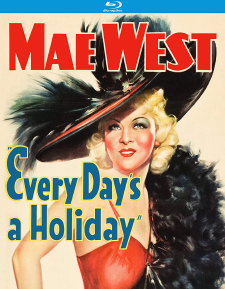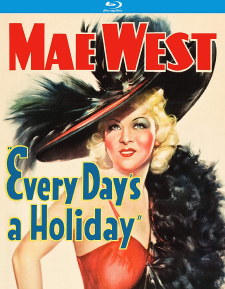Every Day’s a Holiday (1937) (Blu-ray Review)

Director
A. Edward SutherlandRelease Date(s)
1937 (June 29, 2021)Studio(s)
Paramount Pictures/Universal Pictures (Kino Lorber Studio Classics)- Film/Program Grade: B-
- Video Grade: B+
- Audio Grade: B+
- Extras Grade: B
Review
Every Day’s a Holiday finds a tamer, more subdued Mae West, since the enforced Production Code caused her to tone down her double entendres and suggestive dialogue. She stars as Peaches O’Day, a turn of the last century entertainer and grifter who repeatedly sells the Brooklyn Bridge to suckers. Sick of her scams, crooked New York police chief and mayoral candidate John Quade (Lloyd Nolan) issues a warrant for her arrest, but honest cop Captain Jim McCarey (Edmund Lowe) gives her a break and suggests she skip town for a while until things calm down.
She heads to Boston but returns to New York a few months later disguised as French bombshell Mademoiselle Fifi. Her disguise consists primarily of a black wig and outlandishly ornate Schiaparelli-designed gowns and huge hats. Conveniently, for the sake of the story, no one recognizes her, at least for a while.
Written by Mae West herself, the film presents her as a fashion plate of another era whose attitudes are far ahead of their time. Her characters were always Mae West first and foremost, and offered many of her trademarks—the knowing glare, the plays on words, the distinctive walk. But this time, tethered by the Production Code’s censorship, she created a paler version of her earlier pictures. She still manages to elicit laughs, but the jokes don’t land as decisively and many of the comic shenanigans are forced or overdone. A seltzer bottle shooting into the face of Charles Winninger as Peaches’ wealthy benefactor could have been a mildly amusing running gag but is so overused that it becomes tiresome.
West sings Fifi (partly in French, partly with an affected French accent), Little Butterfly, and the title song. Though not among her best, they are welcome moments in a film that lacks comic spark. West’s charm nearly bursts from the screen and her star power carries the film. The male supporting cast is on hand primarily to showcase her. In the finale number, Jubilee, Louis Armstrong leads a parade, singing and playing his trumpet.
Lowe is the reluctant love interest. His McCarey projects the character’s affection for Peaches even as her constant trouble with the law keeps him at arm’s length. It’s only later, when Peaches thinks more about the good of the city than about herself, that McCarey sees the decency that lies beneath the silk, feathers, and ermine.
Director A. Edward Sutherland doesn’t give the film much pizzazz, leaving it up to Mae West to shoulder the picture. Most of the early action takes place as 1899 becomes 1900—the dawn of a new century. Crowds are reveling, drinking, dancing, and celebrating. A production number at the beginning introduces Mae West’s character in a lavish star entrance. It’s impressive, but what follows is definitely second-tier West.
Featuring 1080p resolution, the unrated Blu-ray release from Kino Lorber Studio Classics is presented in the aspect ratio of 1.37:1. The picture quality is very good, considering the film is over 80 years old. Blacks are deep and rich, and levels of grey allow details of West’s costumes to be seen clearly. Most of the film is shot in interiors and contains high key lighting. West is usually bathed in bright light, making her virtually glow in comparison to other actors in the scene. Her form-fitting Schiaparelli gowns are wonders of craftsmanship, replete with sparkles, feathers, fur, and frippery. The elaborate hats add considerable height to the petite West, helping her to dominate scenes. Camera work is fairly routine. The Jubilee number that concludes the film features a white-costumed marching band that really pops. The print is free of dirt, scratches, emulsion clouding, and blurring. There is one jump cut about 12 minutes in, but this is an isolated instance.
The soundtrack is English 2.0 Mono DTS-High Definition Master Audio with optional English subtitles. Dialogue is clear throughout. Charles Winninger literally yells his way through the film, likely at the behest of the director, but his braying is more annoying than amusing. West’s sexy voice and suggestive delivery carry over from earlier films (though her one-liners and puns are not particularly clever or funny). The songs showcase West’s unique ability to convey layered meanings. Louis Armstrong joins the ensemble, his unmistakable voice and trumpet playing the highlight of the Jubilee parade number.
Bonus materials include an audio commentary and several theatrical trailers.
Audio Commentary – Author and film historian Kat Ellinger notes that Every Day’s a Holiday was the last of Mae West’s Paramount films. It’s far less racy than her earlier films because she was “out of sync” with public opinion and the censors. The film is about ushering a new era. Film culture itself had changed. The Production Code’s enforcement resulted in films about female passivity and chastity, and Mae West simply did not fit. Every Day’s a Holiday received withering reviews. Before West is seen, men speak at length about her character, setting the stage for her entrance. A “sexual renegade,” West always seemed to find herself in the midst of one scandal or another. Her screen characters spoke to common people as opposed to the bourgeois middle class. Peaches is morally ambiguous. She’s from the other side of the tracks, possesses street smarts, and infiltrates an upper-class world to create chaos. Director A. Edward Sutherland had a background in comedy, but the commentary doesn’t go into much detail about his career or the careers of the other players. West never acknowledged her directors and demanded sole screenwriting credit. West’s Adam and Eve sketch on a radio program was very suggestive and elicited many complaints from listeners. This controversy occurred around the time Paramount was about to release Every Day’s a Holiday, so West was a bit of a liability for the studio. Privately, West wasn’t a big party goer, didn’t drink or smoke, and was “a straight living individual.” Schiaparelli, who lived in France, designed West’s gowns from a dummy with the actress’ exact measurements because West objected to the long time it would take to fly to France and back for an in-person fitting. The gowns didn’t fit properly, but Edith Head, West’s favorite designer and a friend, made alterations that enabled West and the dresses to look great on screen. Dresses always helped West get into character. The screwball comedy, at its peak when West was making films, depended on sexual energy between men and women. It was not geared for a solo superstar. Excerpts from Mae West’s autobiography are read. Because the supporting male cast is composed of broad physical comedians, Peaches comes off as the cleverest person in the film, completely in control of every situation. From a modern standpoint, female empowerment is explored. Peaches is independent and marches to the beat of her own drum.
Trailers – Six trailers featuring Mae West that are available on Blu-ray from Kino Lorber are included: Every Day’s a Holiday, Goin’ to Town, Night After Night, I’m No Angel, Belle of the Nineties, and My Little Chickadee.
Every Day’s a Holiday doesn’t live up to She Done Him Wrong or I’m No Angel. Mae West had saved Paramount Pictures from bankruptcy, but the Production Code and a letter-writing campaign by the Legion of Decency succeeded in turning West’s sexy, outspoken screen persona into a pale shadow of what it once was.
- Dennis Seuling

